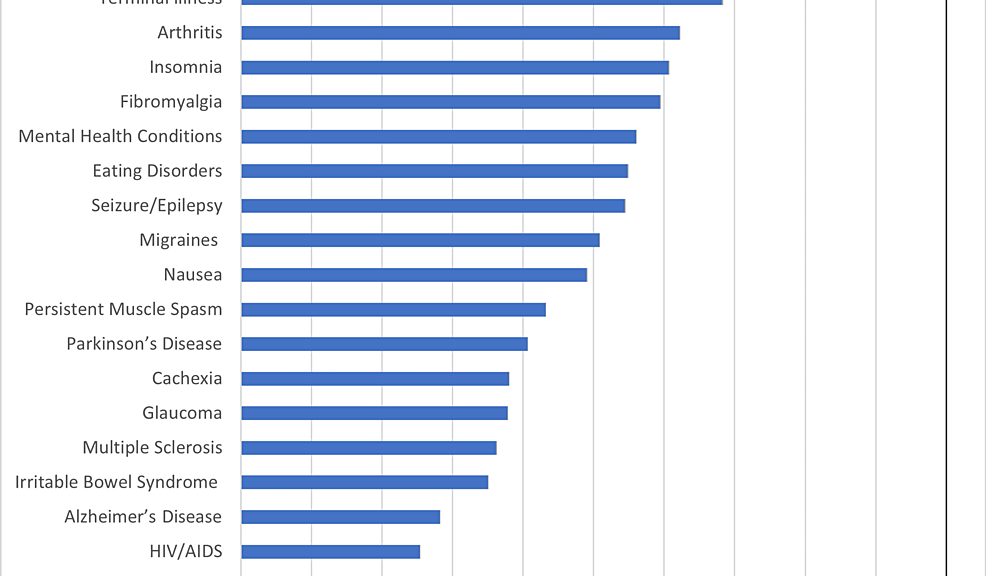The goal of this research was thus to assess the perceived knowledge, beliefs, and perceptions of medical students towards MC, and to obtain a better understanding of factors that may influence their attitudes.
Quantitative data were collected from 526 medical students via an anonymous, online, 32-item questionnaire to determine if perceived knowledge, concerns about the potential negative effects of cannabis, and certain beliefs would significantly contribute to their attitudes toward MC.
Results: A statistically significant regression equation was found: indicating greater perception of knowledge about MC, lower concern for possible negative effects of MC use, greater belief in federal legalization of MC, and greater belief in the federal legalization of recreational cannabis significantly contributed to a higher score on positive attitudes and perceptions toward MC.
Favorable attitudes toward MC among patients exist and as its popularity and acceptance among patients continue, more may be asking their physicians about symptomatic and curative treatment with cannabis-based products.
Given these factors, MC seems to be a critical issue for the medical profession and particularly medical students who, after completing their training, might be expected to prescribe MC and manage therapies.
In a recent systematic review exploring medical professionals and students’ perceptions and knowledge about MC , more than half were conducted exclusively in the US and only two of those were conducted with medical students, one of which was a dissertation study comparing a small sample of medical students to social work students regarding attitudes toward MC .
Between January 25 and March 11, 2022, an anonymous questionnaire was administered via email to all the enrolled 1,447 medical students years one through four, using REDCap, a web application for creating and managing online surveys .
In addition, items to collect data on participants’ personal characteristics (i.e., age, sex, race, ethnicity, year of study, personal use of or knowledge of someone who has used MC, and items about if medical and recreational marijuana should be made legal nationally, were included.
Moreover, the scales i.e., PU-S, PK-S, CNE-S, were normally distributed, implying the data did not deviate from normality enough to affect inference.
Table 3 reports the results of the point-biserial correlation analysis for preliminary hypothesis testing.
Questions in the PU-S had more to do with what a physician can/should do and beliefs about the benefits of using MC, which are highly subjective than undetectable social, cultural, and religious/spiritual influences; these items are dissimilar from more objective questions such as legalization, general knowledge about MC, and detrimental effects of use.
It was not surprising that higher levels of knowledge about MC would be associated with more positive perceptions about it, particularly in medical students who are just learning to accurately assess pain and treat chronic pain as an essential skill.
However, it was expected that medical students, who are generally much younger and thus perhaps more open-minded and informed about cannabis, would have fewer concerns about its use, considering the perceived harmfulness of cannabis has decreased significantly in the past three decades .
As expected, due to the nature of the sample , which may be due to the fact that in Florida where this sample was drawn from, MC is decriminalized whereas recreational cannabis is not.
It is possible that medical students from other schools than the one used for this study will have different opinions that are not represented in this sample.
As the interest in the therapeutic effects of cannibals increases, it is important to establish its efficacy for medicinal use and proper dosing, and evaluate its potential for adverse effects so physicians in training can be equipped with the best available evidence regarding treatment decisions.
Conflicts of interest: In compliance with the ICMJE uniform disclosure form, all authors declare the following: Payment/services info: All authors have declared that no financial support was received from any organization for the submitted work.
© Copyright 2022Jacobs et al.
While all registered Cureus users can rate any published article, the opinion of domain experts is weighted appreciably more than that of non-specialists.
